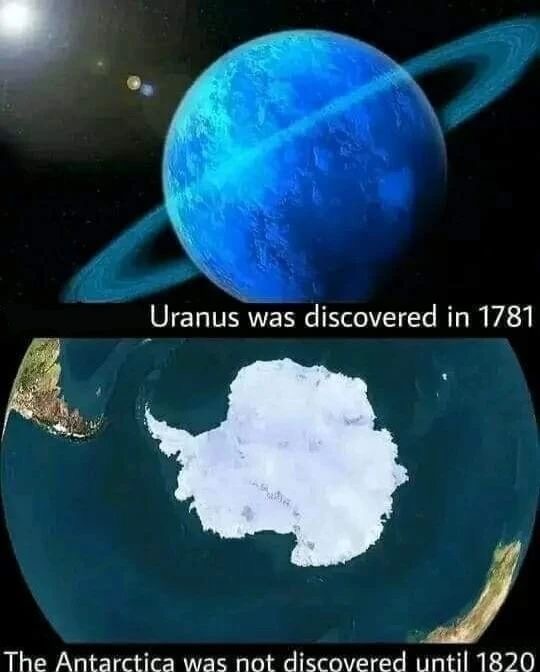Mars surface is studied better than Earth in 2024. Because there are no oceans or trees on Mars.
Funny
General rules:
- Be kind.
- All posts must make an attempt to be funny.
- Obey the general sh.itjust.works instance rules.
- No politics or political figures. There are plenty of other politics communities to choose from.
- Don't post anything grotesque or potentially illegal. Examples include pornography, gore, animal cruelty, inappropriate jokes involving kids, etc.
Exceptions may be made at the discretion of the mods.
To be fair, we don't usually have a clear line of sight to Antarctica.
Some people today couldn't find Uranus with both hands and a flashlight.
Piri reis knew of Antarctica back in the 16th century or something I unno I am no earth scientist
Ooh old cartography I can actually call semi bullshit on this. Basically we knew about a fuckoff big landmass we now call Antarctica (then hypothesized to be Terra Australis) due to the ocean currents around it, but we kept fucking up its location for some reason. Misidentification of Antarctica got so bad that Australia was the most nothern part of it hence why the naming is wrong.
Also a lot of maps made Tierra del Fuego look like it was part of the at the time hypothesized Terra Australas, as I said the misidentification problem got real fucking bad at times. But yeah we knew there was a continent or somethijg down there we just couldnt get to the damned thing because it was too hazardous.
No idea wtf that's supposed to translate as.
I assure you that Uranus has been observed many times by many people dating far back into the past, such as by Hipparchos in 2nd Century BC. They conclusively figured out exactly what it was in 1846.
Well back then, people didn't wear many clothes, so if they bent over you'd see right up their bums.

Twenty centuries of wondering what it is, until someone snapped and said “listen, it’s Uranus, are you happy now?”
If our main sensory organs were sound-based or feel-based, we'd probably have discovered a lot of things before planets and stars.
The things that took a while to discover on earth, or that aren't yet fully explored, are largely because it's hard to see them without getting very close, which can be hard.
Building a good telescope might have been hard, but with a telescope you can see things that are millions of km away. But, because of the earth's curvature, you can't see Antarctica until you're practically next to Antarctica. You can't see the bottom of the ocean until you travel to the bottom of the ocean, or at least until you scan it with sound waves which are then converted into something you can see.
Imagine an alien that developed in the water on a planet with sub-surface oceans with ice on top. No real value for eyes, so they're sound / touch based. Picture what it would be like to try to explore the solar system. There's a boundary layer at the top of their "atmosphere" (the top of the ocean) that's solid (ice), beyond that there's some non-liquid extremely sparse stuff, until some point where no sound travels at all and there's nothing to touch.
Reminds me of Rocky from Project Hail Mary (sort of, they didn't live under ocean but under an extremely hostile-to-us atmosphere).
Yeah, that was my first thought to.
That moment where he learns about relativity is so cute. I should read the book again soon.
His initial reaction was hilariously understandable - a huge WTF? But then being a rational being with super human computational ability he started to realize that it fits all the observations.
...and then he got hit by quantum mechanics off-screen.
Well, we currently know better the moon's surface than our oceans' bottom, so...
It's almost like building telescopes is a bit easier than month-long marine expeditions.
Well I guess it's not immediately apparent. But in hindsight, the kind of telescope you need to see the moon or Uranus isn't quite the investment that a dangerous expedition to unknown lands or the bottom of the sea entails. Nor an observatory or space-bourne telescope for that matter. And you can't use a telescope to discover a continent on earth unless you were already in space.
Yup, if I'm not mistaken, more people went on the Moon than to Challenger Deep. I'm wondering if it would be the same case if the Cold War hadn't started the race to the Moon.
Is this the same "discovered" as America was "discovered" in 1492?
Actually no, I don't think there were any people living in Antarctica.. but I could be wrong.
Probably no settlements, but Polynesians went all over the place so it's not unlikely that they checked it out at some point.
https://en.wikipedia.org/wiki/Polynesian_navigation#Subantarctic_and_Antarctica
Sounds like a "probably not, but maybe."
I'm a big fan of Polynesian sailing and would argue that they were every bit the equal of Age of Sail Europeans, if not superior (even despite lacking compass technology). However, their boats and clothing were generally pretty optimized for the tropics, not polar conditions.
I, for one, wouldn't want to be in the Screaming Sixties wearing a cloak and no pants exposed on the deck of a catamaran, no matter how many seal pelts said cloak was made out of. I can only assume any sane wayfinder would say "fuck this shit" and turn North well before hitting the Antarctic shore.
This is a very human centric definition of discovery.
Penguins had been living there for millenia beforehand.
We are humans...
I was mocking the attitude that something can't be discovered by one group of people if a different group of people already knew about it.
Columbus discovering the Americas is commonly called a "euro-centric definition of discovery". While conveniently ignoring that literally nobody in Europe knew the Americas existed.
That's fair, that can annoy me too occasionally.
But were there people living in the southern hemisphere who knew not to go further south because they'd reach the icy land of certain death?
Probably not. They knew not to go further south because they'd reach the icy ocean of certain death. Because there's no land at 60° South, the winds and currents whip around Antarctica in an uninterrupted circle and there are 100 kph winds and 10+ meter waves most of the time.
See also: "Roaring Forties," "Furious Fifties," and "Screaming Sixties"
There were probably people who knew that if they went further south they'd not come back. On maps locations like these used to be labeled "Here there be monsters" or something like that.
I read about the Antarctic. They kept running into walls of ice before they could find/see it.
